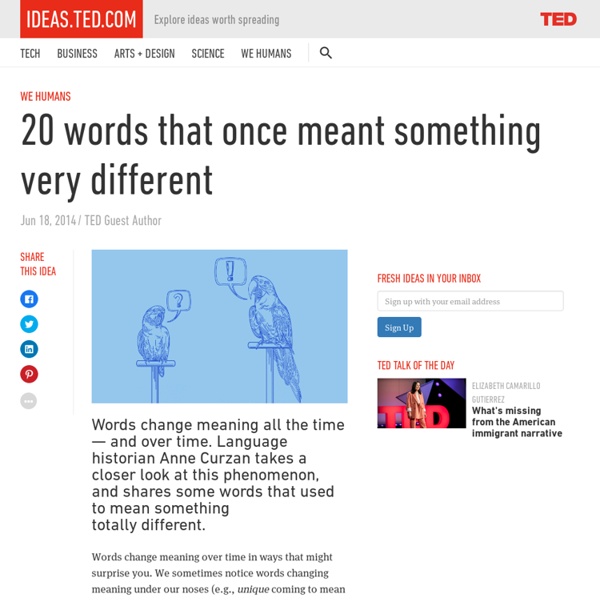The World's Most Spoken Languages And Where They Are Spoken
This beautifully illustrated infographic (above), designed by South China Morning Post’s graphics director Alberto Lucas Lopéz, shows the most spoken known languages in the world and where they’re spoken by the 6.3 billion people included in the study. Based on records collated from the database Ethnologue, the infographic illustrates the wide-ranging facts and figures of the world’s living languages catalogued since 1951. “There are at least 7,102 known languages alive in the world today. Twenty-three of these languages are a mother tongue for more than 50 million people.
Mouth clicks used in human echolocation captured in unprecedented detail
Like some bats and marine mammals, people can develop expert echolocation skills, in which they produce a clicking sound with their mouths and listen to the reflected sound waves to "see" their surroundings. A new study published in PLOS Computational Biology provides the first in-depth analysis of the mouth clicks used in human echolocation. The research, performed by Lore Thaler of Durham University, U.K., Galen Reich and Michael Antoniou of Birmingham University, U.K., and colleagues, focuses on three blind adults who have been expertly trained in echolocation. Since the age of 15 or younger, all three have used echolocation in their daily lives. They use the technique for such activities as hiking, visiting unfamiliar cities, and riding bicycles. While the existence of human echolocation is well documented, the details of the underlying acoustic mechanisms have been unclear.
The secret “anti-languages” you’re not supposed to know - BBC Future
Montgomery thinks we can see a similar process in the lyrics of hip-hop music. As with the other anti-languages, you can witness the blossoming of words for the illegal activities that might accompany gang culture. “There are so many words for firearm, for different kinds of drug, for money,” says Montgomery, who is based at the University of Macau. The police, for instance, are variously known as “berry”, “elroys”, and “Penelope”; crack cocaine can be known as “German chocolate cake”, “hubba” or “a slab”. Again, the imaginitive terms lend themselve to artistic use.
A 3D Map Of The Brain Shows How We Understand Language
<img src="<a pearltreesdevid="PTD2167" rel="nofollow" href=" class="vglnk"><span pearltreesdevid="PTD2168">http</span><span pearltreesdevid="PTD2170">://</span><span pearltreesdevid="PTD2172">pixel</span><span pearltreesdevid="PTD2174">.</span><span pearltreesdevid="PTD2176">quantserve</span><span pearltreesdevid="PTD2178">.</span><span pearltreesdevid="PTD2180">com</span><span pearltreesdevid="PTD2182">/</span><span pearltreesdevid="PTD2184">pixel</span><span pearltreesdevid="PTD2186">/</span><span pearltreesdevid="PTD2188">p</span><span pearltreesdevid="PTD2190">-</span><span pearltreesdevid="PTD2192">cafODhhaQOlCs</span><span pearltreesdevid="PTD2194">.</span><span pearltreesdevid="PTD2196">gif</span></a>" style="display:none" height="1" width="1" alt="Quantcast" /> None
The case of the missing “u”s in American English
Before you consciously became aware of your decision to read this article, your brain was already making the necessary preparations to click the link. There are a few crucial milliseconds between the moment when you’re consciously aware of a plan to act, and the moment you take action. This brief window is thought by some scientists to be the moment in time when we can exercise free will. It gives us the chance to consciously make a decision, suggesting we aren’t just slaves to our impulses.
How we discovered three poisonous books in our university library
Some may remember the deadly book of Aristotle that plays a vital part in the plot of Umberto Eco’s 1980 novel The Name of the Rose. Poisoned by a mad Benedictine monk, the book wreaks havoc in a 14th-century Italian monastery, killing all readers who happen to lick their fingers when turning the toxic pages. Could something like this happen in reality? Poisoning by books?
Internecine - Language errors of the rich and famous
We the people of the United States, in order to form a more perfect union, establish justice, insure domestic tranquility, provide for the common defense, promote the general welfare, and secure the blessings of liberty to ourselves and our posterity, do ordain and establish this Constitution for the United States of America. —Preamble to the United States Constitution, 1787 Most of us, whether we realize it or not, have been taught something of absolute adjectives. These are words which permit no variation of degree; something either is this adjective, or it is not, and there is no wiggle room. The subject has been given considerable attention over the years, as people who care very much about the state of our language have come to the defense of words such as perfect, unique, and supreme, on the grounds that they should not be modified. Yet many writers over the years, including the authors of the United States Constitution, have seen fit to fudge many of these absolute adjectives.
139 Old Norse Words That Invaded The English Language
When I say “Old English” what comes to mind? The ornate, hard-to-read script? Reading Beowulf in your high school English class? The kinds of figurative compound nouns – or kennings – like “swan of blood” and “slaughter-dew” that have sustained heavy metal lyrics for decades? Old English, also known as Anglo-Saxon, was a language spoken by the Angles and the Saxons – the first Germanic tribes to settle the British Isles. They were not the first inhabitants, as any Welsh or Gaelic speaker will tell you, but their language did form the basis for the Angle-ish we speak today.



